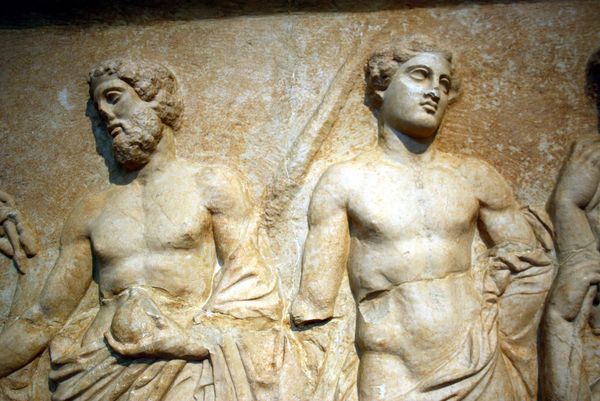June 23, 2003: Difference between revisions
m (Tweaks.) |
(Update.) |
||
| (One intermediate revision by the same user not shown) | |||
| Line 1: | Line 1: | ||
{{ | {{jt|title=Poor Elpenor}} | ||
{{dc|N}}{{start|ear the end of his stay with Circe in Book X of the ''Odyssey'',}} Odysseus and crew prepare to leave Aiaia and head for the Underworld. It wasn’t his idea: Circe told him to go to hell. Well, what does he expect? He hung out with her for a year, ate her food, shared her “flawless bed of love,” and one day — from the prompting of his men — decides to leave, and fairly urgently judging by what happens to Elpenor. | {{dc|N}}{{start|ear the end of his stay with Circe in Book X of the ''Odyssey'',}} Odysseus and crew prepare to leave Aiaia and head for the Underworld. It wasn’t his idea: Circe told him to go to hell. Well, what does he expect? He hung out with her for a year, ate her food, shared her “flawless bed of love,” and one day — from the prompting of his men — decides to leave, and fairly urgently judging by what happens to Elpenor. | ||
| Line 18: | Line 17: | ||
{{Notes}} | {{Notes}} | ||
{{ | {{Epic}} | ||
{{2003|state=collapsed}} | |||
[[Category: | [[Category:06/2003]] | ||
[[Category:Homer]] | [[Category:Homer]] | ||
Latest revision as of 08:39, 10 May 2023
Poor Elpenor
Near the end of his stay with Circe in Book X of the Odyssey, Odysseus and crew prepare to leave Aiaia and head for the Underworld. It wasn’t his idea: Circe told him to go to hell. Well, what does he expect? He hung out with her for a year, ate her food, shared her “flawless bed of love,” and one day — from the prompting of his men — decides to leave, and fairly urgently judging by what happens to Elpenor.
Apparently, this idiot climbed up on the roof of Circe’s barn, or some other obscure part of her house, and proceeded to drink enough wine to cause him to pass out. There he slept, like a drunken little piggie, all night, until the voices of the crew preparing to leave woke him up. Maybe he was still drunk, but he stirred and fell off the roof — probably forgot he had climbed up there “to taste the cool night” — breaking his neck, and killing himself instantly. A true hero’s death.
In all their hasty preparation to get out of town, no one saw Elpenor fall, nor did they miss him at all. Instead, they sailed straight to hell; only then did they encounter his shade. Odysseus seemed surprised as he listened to his dead oarsman’s sob story. The latter asks Odysseus to return to Aiaia — apparently Circe’s island is on the way to hell — and give him a proper burial: “Heap up the mound there, and implant upon it / the oar I pulled in life with my companions.”[1] Now, I’m not one to knit-pick (OK, maybe I am), but you’d think they’d miss one of their oarsmen. Maybe Elpenor had halitosis, BO, or some other execrable quality that the rest of the men found offensive, so he had no friends, relegated to spending time on roofs with bottles of wine. Maybe he was too stupid to have any friends. Yet, if he made it through the Trojan war, he can’t be too dumb.
What this episode is doing in the text? It spans three books, X-XII, and just seems to be an afterthought — another repetitive incident to annoy students and professors alike.
Since Books IX though XII are narrated by Odysseus, the Elpenor episode is obviously important to his journey and personal growth somehow. Perhaps the Odysseus that forgets Elpenor on Aiaia is not the same one that returns to bury him after chatting with the Underworld’s grim gathering of shades. Maybe seeing the shade of his dead crewman, even someone as seemingly insignificant as an oarsman, struck Odysseus in a way that seeing the heroes of the Trojan war doesn’t. Or, seeing Elpenor in the same state that Achilles and Agamemnon are in finally makes him realize that death is the great leveler. No matter one’s position while alive, everyone comes to the same place eventually. Therefore, everyone deserves to be treated fairly and humanely while alive. This lesson is similar to the one that Gilgamesh eventually brings home to Uruk.
Sounds good, and I wish I could believe it, but much of Odysseus’ subsequent actions suggest that he does not learn this lesson, or is still learning it as he travels home. Sure, he returns to bury Elpenor, but lets Circe talk him into traveling past the sirens, Scylla and Charybdis, and other perils as well. This he does without even seeing if there was another way, knowing full well that his men would be eaten by Scylla, perhaps swallowed by Charybdis, and lose their lives on the Island of the Sun. However, we do see the integral parts that the swineherd and cowherd play in Odysseus’ subsequent battle with the suitors; had it not been for them, Odysseus might not have been victorious.
Poor confusing Elpenor: you’ll be remembered as an idiot who fell off the roof, but one who became important after Odysseus’ life lesson in the underworld.
notes
- ↑ XI.87–88
